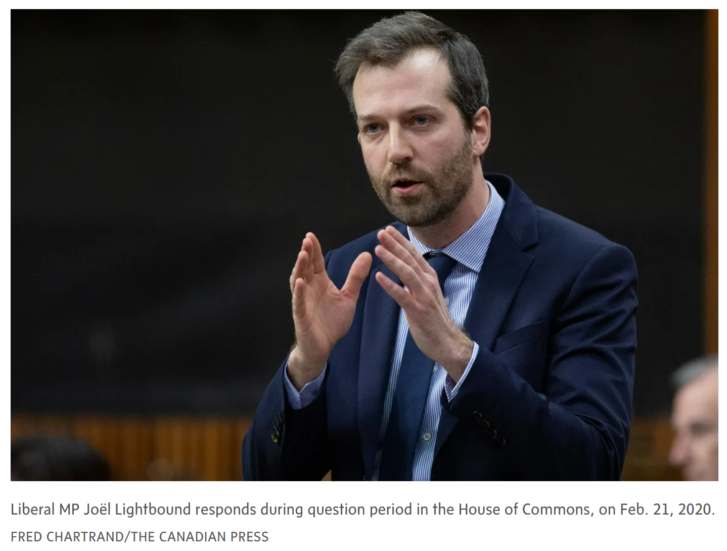“I can’t help but notice with regret,” Quebec MP Joël Lightbound said Tuesday, as he punctured the image of magnanimous governance that the Liberals have tried to promote throughout this pandemic, “that both the tone and the policy of my government changed drastically on the eve and during the last election campaign.”
“From a positive and unifying approach, a decision was made to wedge, to divide and to stigmatize.”
Mr. Lightbound, who has now likely entrenched his position as a forever backbencher within this caucus, gave voice to what the Liberal government – or any government, really – understands implicitly, even if only a heretic will utter it aloud: division, which is terrible for the country, is good for the party. Wedges rally the base and corner the opposition.

The Liberals sudden pre-election support for vaccine mandates, which Prime Minister Justin Trudeau had earlier called “divisive,” was a politically savvy move at a time when the majority of Canadians supported restrictions on the unvaccinated. It continues to serve the Liberals’ narrow political interests for Canadians to see the unvaccinated as fringe and selfish conspiracy theorists, rather than misinformed, misguided but reachable neighbours, friends or family members. And it’s useful to lump in those who question the ongoing practicality of certain pandemic policies with truck drivers who blared their horns for more than a week in a capital city occupation.
A few Conservatives have tried to speak for constituents with legitimate concerns about finding off-ramps for pandemic policies. But the party’s credibility on this issue has been undermined by select members who think that cheering on truckers who block borders and seize downtown streets is a smart way to appeal to Canadians who have grown tired of restrictions. (Lord help the Conservative Party; one day it will come across a trap and not immediately strip down naked and jump in.)
Mr. Lightbound, however, is unencumbered by the baggage toted around by Conservative MPs, and he also cannot be dismissed as fringe or reckless by his Liberal colleagues. Indeed, his is a voice in Ottawa that speaks for the Canadians who occupy the space between the extremes – those who believe that COVID-19 is real, that vaccines work, that the pandemic is still ongoing, but that it is time to follow the lead of Norway, Denmark, England, Ireland, France and both red and blue U.S. states and transition to an endemic view of COVID-19.
There are some policies the federal government could do away with immediately that would catalyze the transition and have virtually no effect on the state of the pandemic. The most obvious is the random and wholly useless testing of fully vaccinated air travellers who land in Canada, which is costing Ottawa hundreds of millions of dollars, even though positivity rate data has shown for months that COVID-19 transmission is happening primarily in the community, not coming in from across the border.
Another is the vaccination mandate for Canadian truck drivers, though the federal government would obviously be loath now to scrap the policy and hand convoy organizers a win. Still, though the U.S. border policy banning entrance to unvaccinated foreigners made the protest over Canada’s trucker mandate futile, disgruntled truck drivers were right to initially point out the absurdity of a vaccine requirement for drivers who spend most of their time alone in their cabs. According to the Canadian Trucking Alliance, 90 per cent of truck drivers were already vaccinated when the government implemented the measure anyway, which raises the question of whether a mandate was actually needed in the first place. The federal government never did offer an explanation – one rooted in science and evidence, that is – as to why this policy was being introduced when it was.
With COVID-19 vaccination now as high as it is in Canada (roughly 89 per cent of those age five and up have received at least one dose), it is worth considering whether any incremental increase in uptake we might see from new or ongoing mandates will be worth compounding the anger, polarization and logistical challenges that will come with them. (The same question can be asked of other public health restrictions, though that is primarily provincial jurisdiction, and some premiers in recent days have announced plans for dropping them.)
Pandemic restrictions come with costs, and it’s reasonable to question whether Canada is now at the point whether those costs outweigh the benefits, particularly now that most Canadians have some form of immunity, and those who do not will have access to therapeutics. As Chief Public Health Officer Theresa Tam said earlier this month, at some point Canada’s focus has to shift to building health care capacity to deal with this issue long-term. Many Canadians – the majority, in fact, according to polling – believe we have come to that point now, and finally they have an advocate within the federal Liberal caucus.
Article From: Globe and Mail
Author: ROBYN URBACK

